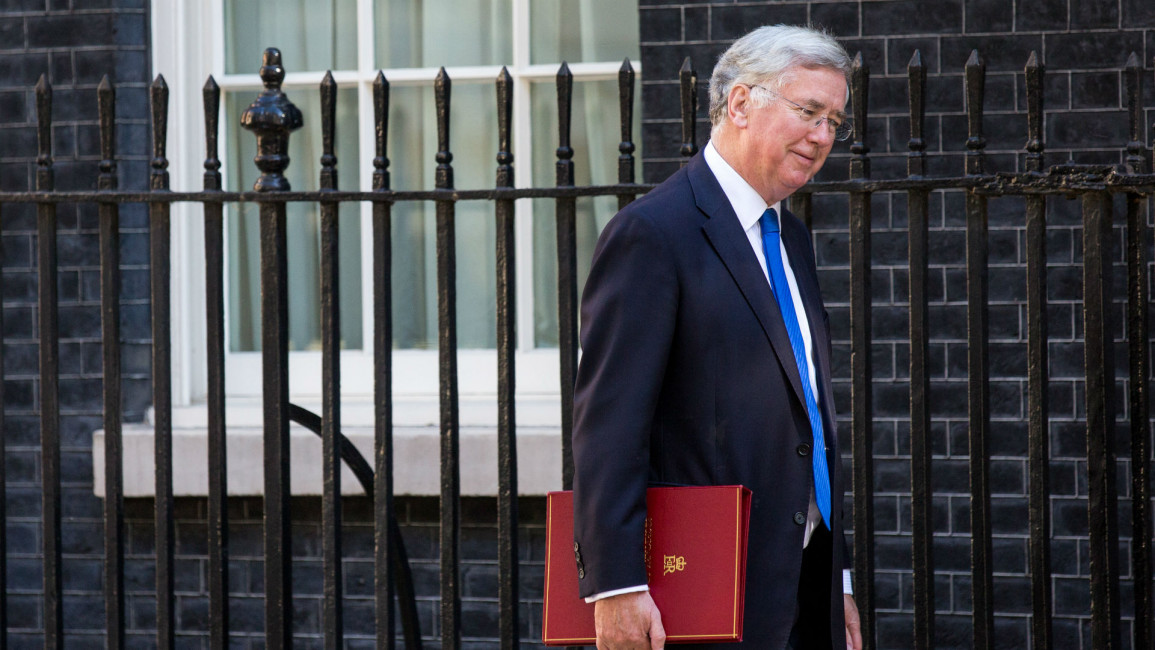Is the UK preparing for war in Syria?
Is the UK preparing for war in Syria?
Analysis: British defence minister calls for attacks on the IS group in Syria as well as Iraq - a policy change that faces resistance from many opposed to more war.
3 min read
Fallon said it was illogical to attack the IS in Iraq but not Syria [Getty]
The British defence minister told the House of Commons on Thursday they should consider airstrikes against the Islamic State group in Syria as well as Iraq.
Michael Fallon told the house that there was a case for taking action in Syria, but the government would "not bring a motion to this House on which there is not some consensus".
Thirty of the 38 people killed in last Friday’s attack on a beach hotel in Tunisia were British. The IS claimed it ordered the attack.
An appropriate response
Speaking on the BBC programme Question Time on Thursday, the Conservative MP Jeremy Hunt said the UK faced a simple choice: "Are we going to be strong or are we going to be weak in our response?"
He added: "This is a very serious threat and we have to do what it takes."
Labour MP Jeremy Corbyn said it was necessary to look at the causes of what was happening in the entire region, adding: "You’ve got to think through the policies we have been following for the last 15 years, in Afghanistan, Iraq and Libya, are they not a contributory factor in the collapse of so much all across the region?”
Hunt responded that the problem was not UK foreign policy, it was about ideology, as the attacks of 11 September 2001 happened before the invasion of Iraq.
The UK parliament voted in September to attack militants in Iraq, but not Syria. The UK opposes the regime of Syrian President Bashar al-Assad.
Dealing with the Syrian regime
However, parliament rejected the government's proposal for military action against the Syrian regime in August 2013 to deter the regime's use of chemical weapons.
Fallon on Thursday said "any action we take must not provide any succor to Assad or Assad's regime." But he added it was clear that actions by IS, "in Iraq and elsewhere - and probably in Libya - are being directed from northern Syria."
He had earlier said that not attacking IS positions in Syria, was illogical - the group doesn't differentiate between Syria and Iraq.
But Crispin Blunt, chairman of parliament's Foreign Affairs Committee, said British strikes in Syria would make "no practical difference" to the US-led military campaign and would lead Britain into a legal gray area.
Vernon Coaker, the defence spokesman for the opposition Labour, said his party would consider backing Syria action, but it "must command the support of other nations in the region, including Iraq and the coalition already taking action in Syria."
No vote on the issue is scheduled. Cameron's office said more deliberation was needed before a decision could be made.
Michael Fallon told the house that there was a case for taking action in Syria, but the government would "not bring a motion to this House on which there is not some consensus".
Thirty of the 38 people killed in last Friday’s attack on a beach hotel in Tunisia were British. The IS claimed it ordered the attack.
An appropriate response
Speaking on the BBC programme Question Time on Thursday, the Conservative MP Jeremy Hunt said the UK faced a simple choice: "Are we going to be strong or are we going to be weak in our response?"
| The problem is not British foreign policy, it is ideology. -Jeremy Hunt, Conservative MP |
Labour MP Jeremy Corbyn said it was necessary to look at the causes of what was happening in the entire region, adding: "You’ve got to think through the policies we have been following for the last 15 years, in Afghanistan, Iraq and Libya, are they not a contributory factor in the collapse of so much all across the region?”
Hunt responded that the problem was not UK foreign policy, it was about ideology, as the attacks of 11 September 2001 happened before the invasion of Iraq.
The UK parliament voted in September to attack militants in Iraq, but not Syria. The UK opposes the regime of Syrian President Bashar al-Assad.
Dealing with the Syrian regime
However, parliament rejected the government's proposal for military action against the Syrian regime in August 2013 to deter the regime's use of chemical weapons.
Fallon on Thursday said "any action we take must not provide any succor to Assad or Assad's regime." But he added it was clear that actions by IS, "in Iraq and elsewhere - and probably in Libya - are being directed from northern Syria."
He had earlier said that not attacking IS positions in Syria, was illogical - the group doesn't differentiate between Syria and Iraq.
But Crispin Blunt, chairman of parliament's Foreign Affairs Committee, said British strikes in Syria would make "no practical difference" to the US-led military campaign and would lead Britain into a legal gray area.
Vernon Coaker, the defence spokesman for the opposition Labour, said his party would consider backing Syria action, but it "must command the support of other nations in the region, including Iraq and the coalition already taking action in Syria."
No vote on the issue is scheduled. Cameron's office said more deliberation was needed before a decision could be made.



